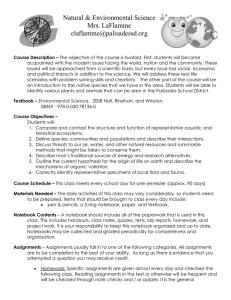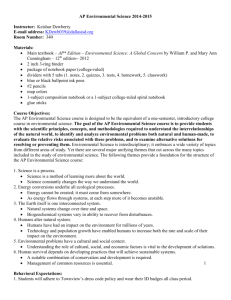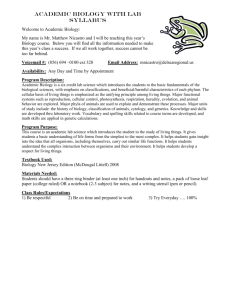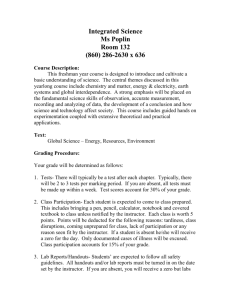Biology Syllabus - Palisades School District
advertisement
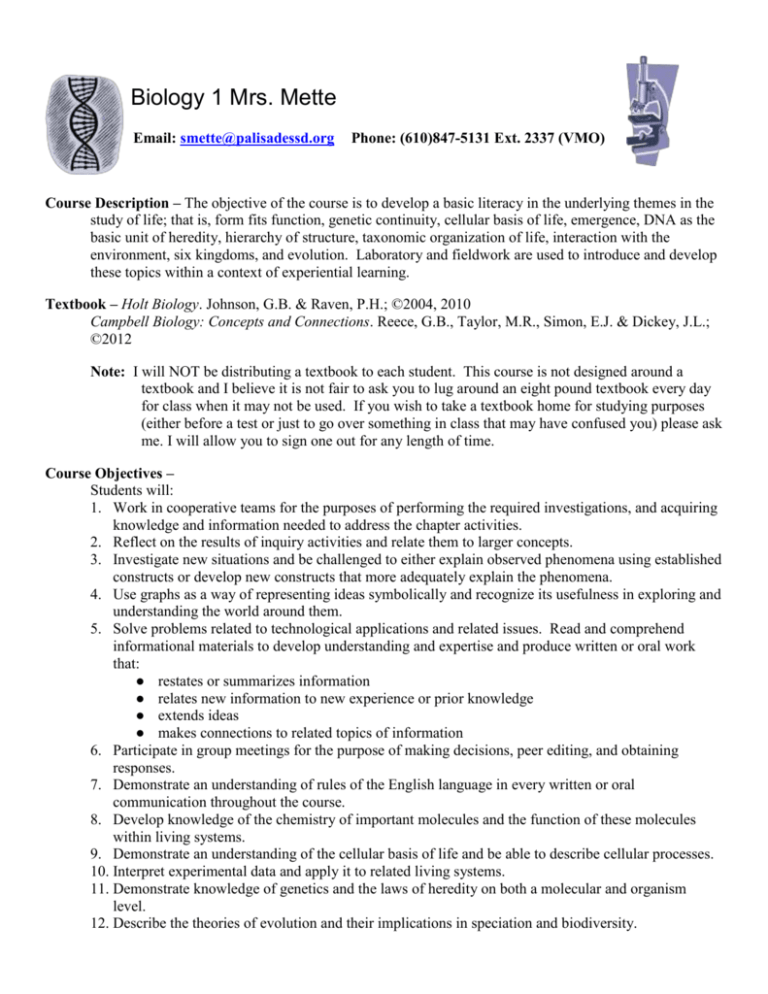
Biology 1 Mrs. Mette Email: smette@palisadessd.org Phone: (610)847-5131 Ext. 2337 (VMO) Course Description – The objective of the course is to develop a basic literacy in the underlying themes in the study of life; that is, form fits function, genetic continuity, cellular basis of life, emergence, DNA as the basic unit of heredity, hierarchy of structure, taxonomic organization of life, interaction with the environment, six kingdoms, and evolution. Laboratory and fieldwork are used to introduce and develop these topics within a context of experiential learning. Textbook – Holt Biology. Johnson, G.B. & Raven, P.H.; ©2004, 2010 Campbell Biology: Concepts and Connections. Reece, G.B., Taylor, M.R., Simon, E.J. & Dickey, J.L.; ©2012 Note: I will NOT be distributing a textbook to each student. This course is not designed around a textbook and I believe it is not fair to ask you to lug around an eight pound textbook every day for class when it may not be used. If you wish to take a textbook home for studying purposes (either before a test or just to go over something in class that may have confused you) please ask me. I will allow you to sign one out for any length of time. Course Objectives – Students will: 1. Work in cooperative teams for the purposes of performing the required investigations, and acquiring knowledge and information needed to address the chapter activities. 2. Reflect on the results of inquiry activities and relate them to larger concepts. 3. Investigate new situations and be challenged to either explain observed phenomena using established constructs or develop new constructs that more adequately explain the phenomena. 4. Use graphs as a way of representing ideas symbolically and recognize its usefulness in exploring and understanding the world around them. 5. Solve problems related to technological applications and related issues. Read and comprehend informational materials to develop understanding and expertise and produce written or oral work that: ● restates or summarizes information ● relates new information to new experience or prior knowledge ● extends ideas ● makes connections to related topics of information 6. Participate in group meetings for the purpose of making decisions, peer editing, and obtaining responses. 7. Demonstrate an understanding of rules of the English language in every written or oral communication throughout the course. 8. Develop knowledge of the chemistry of important molecules and the function of these molecules within living systems. 9. Demonstrate an understanding of the cellular basis of life and be able to describe cellular processes. 10. Interpret experimental data and apply it to related living systems. 11. Demonstrate knowledge of genetics and the laws of heredity on both a molecular and organism level. 12. Describe the theories of evolution and their implications in speciation and biodiversity. 13. Explain and compare the structure and function of animal and plant systems and their adaptations. Course Schedule – This class meets every school day for one semester (approx. 90 days) Materials Needed – The daily activities of this class may vary considerably, so students need to be prepared. Items that should be brought to class every day include: ● pen & pencils, a 3-ring notebook, paper, and your lab notebook. Notebook Contents – A notebook should include all of the paperwork that is used in this class. This includes handouts, class notes, quizzes, tests, homework, field / safari journals, and project work. It is your responsibility to keep this notebook organized and up to date. The final in biology is cumulative so save EVERYTHING. Notebooks may be collected and graded periodically for completeness & organization. Your notebook should be organized in the following sections: 1. 2. 3. 4. 5. Bellringer Pages Notes/Worksheets/Handouts Graded Assignments Quiz/Test/Project Log Important Papers Lab Notebook – This is a composition notebook that will include all notes, lab data, observations, and field / safari journals. It is your responsibility to keep this notebook in a safe place and to bring it to class every day. Lab notebooks will be collected and graded throughout the semester. Assignments – Assignments usually fall in to one of the following categories. All assignments are to be completed to the best of your ability. As long as there is evidence that you attempted a question you may receive credit. ● Homework: Specific assignments are given almost every day and checked the following class. Reading assignments in the text or otherwise will be frequent and will be checked through note checks and / or quizzes. It is the general expectation that even if no specific assignment is given, students will spend time reviewing notes and other material covered in class. ● Labs: Throughout the course, activities and labs will be conducted in order to strengthen understanding and develop inquiry skills. Labs may be directed with specific instructions or open-ended allowing students to develop their own procedures. Both formal and informal writeups may be required at the conclusion of the lab. ● Quizzes: Quizzes will be used frequently to assess progress. These short assessments may be announced or unannounced. Often, quizzes will be used at the beginning of a class to check homework or at the end of a lesson to check understanding. ● Tests: Tests will always be announced a week in advance and usually occur at the end of a unit. Formats of tests vary depending on the material. See the quiz/test policy below for retake policies. Retaking tests are not meant to be a do-over, but as a way to improve your understanding of material. Grades may or may not be improved by retaking tests. ● Projects: Many units will include various larger projects that are designed to deepen understanding of the content, as well as developing applied skills. Plagiarism & Cheating – It is the expectation of all students that any work handed in is completely the work of the student. If outside sources are used, they should be properly cited using APA format. Any cases of plagiarism or cheating will be dealt with according to school rules. This includes a zero on the assignment, parent notification, in-school suspension, a parent conference, and the possibility for other academic privileges to be taken away. There will be a significant amount of group work and collaboration in this course. If, at any time, you are unsure of the expectation for the assignment, PLEASE ASK!! Grading – Grades will correspond to the school’s grading system: Each marking period consists of 40% of the total grade with the final being worth 20%. Interim grade reports will be distributed periodically throughout the semester. Your grades can be checked online on the district website Work will be expected to be handed in on time and complete Late work will be deducted 10% per day Points will also be deducted for incomplete work Test and Quiz Policy – All tests and quizzes will be kept in the classroom in a student folder until the end of the semester. Students may stay after school to look at their tests or quizzes; additionally, students may take the folder home to study for the final. If a student scores below 70% on a test, they are eligible for a “second chance”. A “second chance” test must be taken before or after school within a week of the original test, Arrangements need to be made between the teacher and student the day prior to the makeup. You may only use your “second chance” once per marking period! A “second change” is not retaking the same test over again. The grade for the test will be the average of the original and make-up grades; to be fair to other students who did well on the test, the average of your original and make-up grade cannot exceed 70% (C-). Quiz retakes are only available for special circumstances. Attendance and Missed Work – Students are responsible for making up any missed work. All missed work should be completed and turned-in in a timely manner upon the students return. In some cases time will need to be scheduled after school to make up a labs or other class work. If students know they will miss class in advance, they should ask the instructor for work before the absence. Each class has an absent folder located at the front of the room. I will not chase you down if you missed class and important information. Ask three before me! Contact Information & Extra Help– The best method of contacting me is via e-mail at smette@palisadessd.org. I am available most days after school, but please check in advance to be sure. I am available for study sessions every day until 3:00pm for students wishing to get extra help or for those who have questions about what we are learning. Other important information can also be found on my website and Course Sites. If you need to stay longer for help or to work on a project please let me know in advance so I can make arrangements! Class Rules & Expectations – All school policies apply. We will develop our own class rules together and adjust them as needed. Generally speaking, everyone should respect each other, respect the physical environment, and respect the learning process. Portfolio Development – Students may wish to document their improvement in science by including certain activities in their portfolio. These activities include lab reports, diagrams and models, group projects and scientific writing. Safety Considerations – Science classrooms can be dangerous and it is vital that students listen to and follow all safety instructions. Students not paying attention to directions put themselves and their classmates at risk. This will not be tolerated; if you are putting yourself or a classmate in danger, you will be immediately removed from class and sent to the office. Computer Policy - There will be many times during the semester where we will be using the school’s computers. These times are to be used for doing work only. Game playing, instant messaging, emailing, and viewing inappropriate sites are not permitted. Failure to comply will result in the loss of computer privileges. Outline of Course Content – Beginning with the class of 2014, the Biology Keystone will be given in place of the 11th grade Science PSSA. All students completing biology will be required to score proficient on the Biology Keystone in order to graduate. Please visit my Palisades website or the following site for more information on the test: http://www.pdesas.org/module/assessment/Keystone.aspx (click Science, the assessment anchors and scoring guidelines for open ended questions can be found on this page.) ● ○ ○ ● ○ ○ ○ ● ○ ○ ● ○ ○ ● ○ ○ ● ○ ○ ○ ○ ● ○ ○ ○ ● ○ ○ Basic Biological Principles Explain the characteristics common to all organisms (A.1.1) Describe relationships between structure and function at biological levels of organization (A.1.2) The Chemical Basis for Life Describe how the unique properties of water support life on Earth (A.2.1) Describe and interpret relationships between structure and function at various levels of biochemical organization (A.2.2) Explain how enzymes regulate biochemical reactions within a cell (A.2.3) Bioenergetics Identify and describe the cell structures involved in processing energy (A.3.1) Identify and describe how organisms obtain and transform energy for their life processes (A.3.2) Homeostasis and Transport Identify and describe the cell structures involved in transport of materials into, out of, and throughout the cell (A.4.1) Explain mechanisms that permit organisms to maintain biological balance between their internal and external environments (A.4.2) Cell Growth and Reproduction Describe the three stages of the cell cycle: interphase, nuclear division, cytokinesis (B.1.1) Explain how genetic information is inherited (B.1.2) Genetics Compare Mendelian and non-Mendelian patterns of inheritance (B.2.1) Explain the process of protein synthesis (i.e., transcription, translation, and protein modification) (B.2.2) Explain how genetic information is expressed (B.2.3) Apply scientific thinking, processes, tools, technologies in the study of genetics (B.2.4) Theory of Evolution Explain the mechanisms of evolution (B.3.1) Analyze the sources of evidence for biological evolution (B.3.2) Apply scientific thinking, processes, tools, and technologies in the study of the theory of evolution (B.3.3) Ecology Describe the ecological levels of organization in the biosphere (B.4.1) Describe interactions and relationships in an ecosystem (B.4.2) Please note: the amount of time spent on the course content may vary to fit the needs of a particular group of students.

